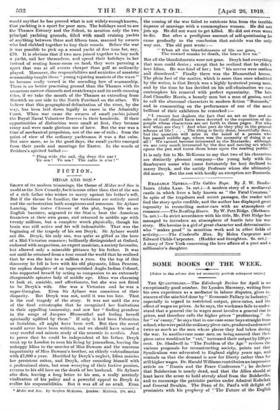FICTION.
MIDAS AND SON.*
&roux of its modern trimmings, the theme of Midas and Son is as old as the New Comedy,for it is none other than that of the son of a rich father who wishes to marry against his father's will. But if the theme be familiar, the variations are entirely novel and the orchestration both sumptuous and sonorous. Sir Aylmer Lancing, the iratua Chremea of the plot, began life as an English barrister, migrated to the Statzs, beat the American financiers at their own game, and returned in middle age with twenty millions, but a complete wreck physically, though his brain was still active and his will indomitable. That was the beginning of the tragedy of his son Deryk. Sir Aylmer would not die. Deryk, his only son, was quite as gifted as-the hero of a Mid-Victorian romance; brilliantly distinguished at Oxford, endowed with magnetism, an expert musician, a society favourite, but allowed only a miserable pittance by his father. It was not until he returned from a tour round the world that he realized that he was the heir to a million a year. On the top of this discovery he fell in love with his old playmate, Idina Penrose, the orphan daughter of an impoverished Anglo-Indian Colonel, who supported herself by acting as companion to an extremely disagreeable spinster lady of middle age. Idina was charming to look at, amiable, and affectionate, but she was not fitted to be Deryk's wife. She was a Victorian and he was a super-Georgian. Even Sir Aylmer was conscious of their disparity. But Deryk was not, until it was too late. That is the real tragedy of the story. It was not until the eve of the final catastrophe that he recognized her limitations in their appalling immensity, and saw her "finding grandeur in the songs of Jacques Blumenthal and feeling herself spiritually uplifted by them." If only it had been Palestrina or Scriabine, all might have been well. But then the novel would never have been written, and we should have missed a very careful and minute study of the neurotic in excelsis. Just to prove that he could be independent of his father, Deryk went up to London to earn his living by journalism, leaving the unhappy Idina to the mercies of Miss Dawson and the 'amorous importunity of Miss Dawson's brother, an elderly valetudinarian with £7,000 a year. Mortified by Deryk's neglect, Idina marries her persistent suitor, and Deryk, after consoling himself with a professional siren, but soon wearying of their furtive passion, returns to his old love on the death of her husband. Sir Aylmer also dies, leaving a long letter to his son, a really masterly vindication of his policy and a powerful appeal to Deryk to realize his responsibilities. But it was all of no avail. Even • Midas and Son. By Stephen Sic cam, London: Methuen. ifis, the coming of the war failed to extricate him from the terrible impasse of marriage with a commonplace woman. He did not join up. He did not want to get killed. Ho did not even want to die. But after a prodigious amount of self-questioning he came gradually to the conclusion that suicide was the only way out. The old poet wrote :—
" When all the blandishments of life are gone, The coward sneaks to death, the brave live on."
But all the blandishments were not gone. Deryk had everything that man could desire ; except that he realized that he didn't love Idina. He was fond of her ; but " his nerves were restless and disordered." Finally there was the Blumenthal horror. The plain fact of the matter, which is more than once admitted by the writer, is that Deryk was a highly hysterical young man, and by the time he has decided on his self-elimination we can contemplate his removal with perfect equanimity. The late Joel Chandler Harris, a homely man but a man of genius, used to call the abnormal characters in modern fiction "Buzzards," and in commenting on the performance of one of the most brilliant of their exhibitors he remarked:
44I cannot but deplore the fact that an art eo fine and so sure of itself should have been devoted to the exposition of the people whose characters are set forth in these pages. For who and what are they ? And what part do they play m the general scheme of life? . . The thing is finely done, beautifully done, but the question will arise in the mind of a person who has passed middle age, where was the necessity of doing it at all t We cannot become interested in the Buzzards; although we are very much interested by the fine and moving art which opens the pen and turns them loose upon the reading public."
It is only fair to Mr. McKenna to say that two of his characters are distinctly pleasant company—the young lady with the flamboyant name who (most fortunately for her) declined to marry Deryk, and the untidy Professor whom she ultimately did marry. But the rest with hardly an exception are Buzzards.






































 Previous page
Previous page